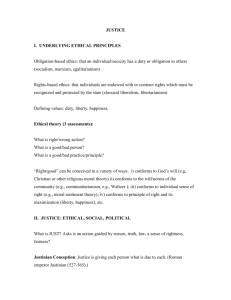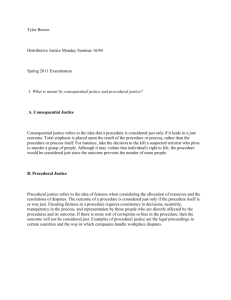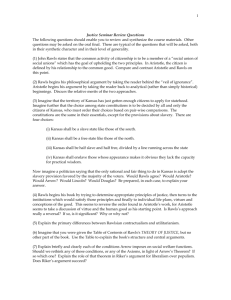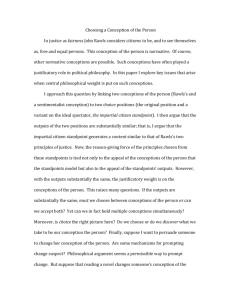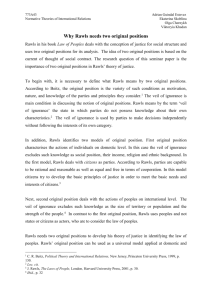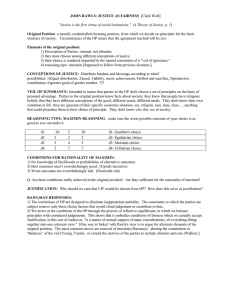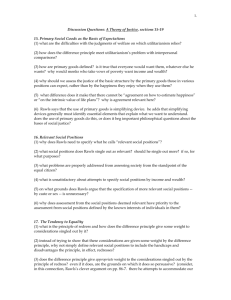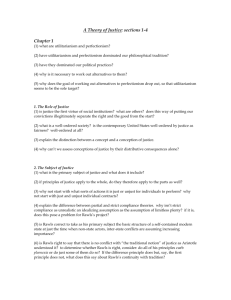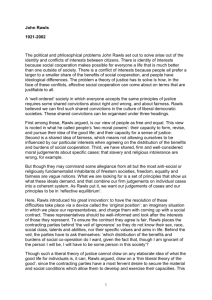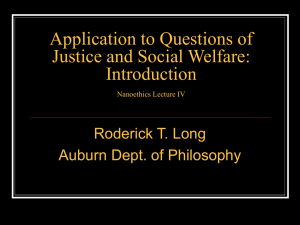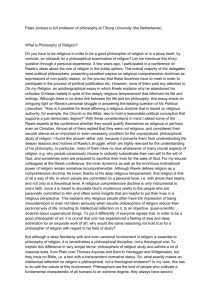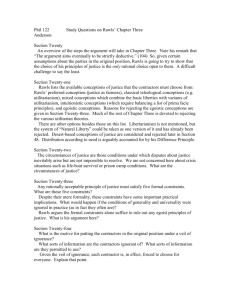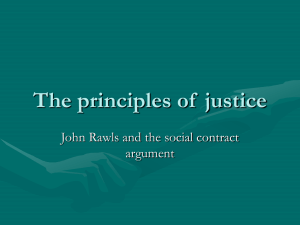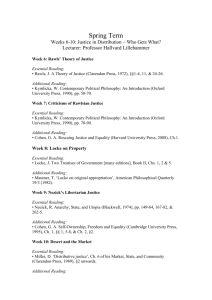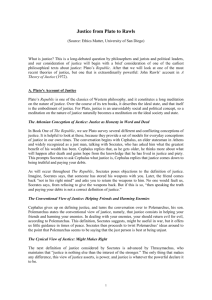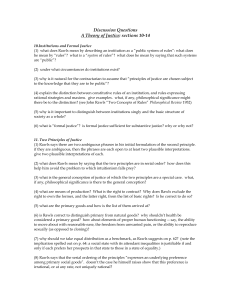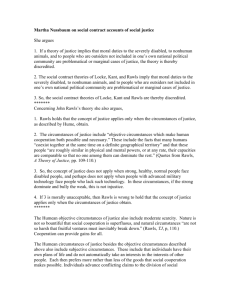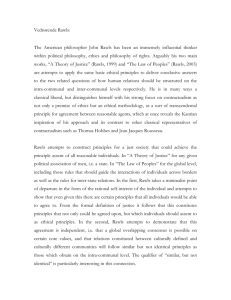Discussion Questions: A Theory of Justice
advertisement
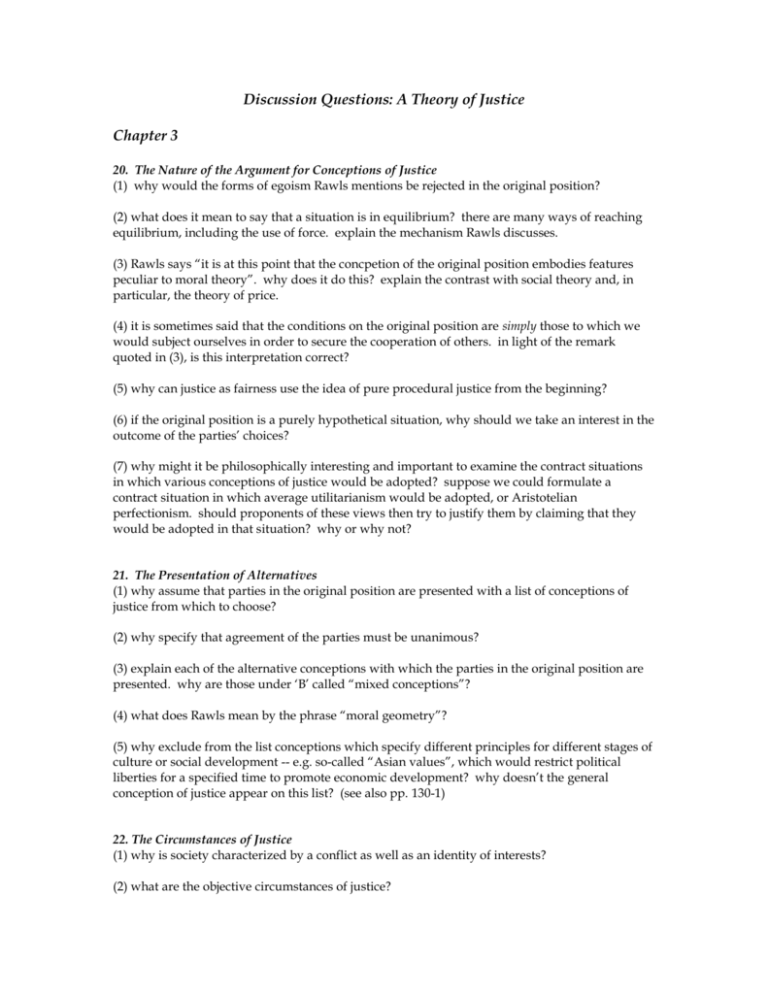
Discussion Questions: A Theory of Justice Chapter 3 20. The Nature of the Argument for Conceptions of Justice (1) why would the forms of egoism Rawls mentions be rejected in the original position? (2) what does it mean to say that a situation is in equilibrium? there are many ways of reaching equilibrium, including the use of force. explain the mechanism Rawls discusses. (3) Rawls says “it is at this point that the concpetion of the original position embodies features peculiar to moral theory”. why does it do this? explain the contrast with social theory and, in particular, the theory of price. (4) it is sometimes said that the conditions on the original position are simply those to which we would subject ourselves in order to secure the cooperation of others. in light of the remark quoted in (3), is this interpretation correct? (5) why can justice as fairness use the idea of pure procedural justice from the beginning? (6) if the original position is a purely hypothetical situation, why should we take an interest in the outcome of the parties’ choices? (7) why might it be philosophically interesting and important to examine the contract situations in which various conceptions of justice would be adopted? suppose we could formulate a contract situation in which average utilitarianism would be adopted, or Aristotelian perfectionism. should proponents of these views then try to justify them by claiming that they would be adopted in that situation? why or why not? 21. The Presentation of Alternatives (1) why assume that parties in the original position are presented with a list of conceptions of justice from which to choose? (2) why specify that agreement of the parties must be unanimous? (3) explain each of the alternative conceptions with which the parties in the original position are presented. why are those under ‘B’ called “mixed conceptions”? (4) what does Rawls mean by the phrase “moral geometry”? (5) why exclude from the list conceptions which specify different principles for different stages of culture or social development -- e.g. so-called “Asian values”, which would restrict political liberties for a specified time to promote economic development? why doesn’t the general conception of justice appear on this list? (see also pp. 130-1) 22. The Circumstances of Justice (1) why is society characterized by a conflict as well as an identity of interests? (2) what are the objective circumstances of justice? (3) what are the subjective circumstances of justice? (4) explain what is meant by saying that parties in the o.p. take no interest in one another’s interests? (5) what explanation does Rawls give of the fact that people have diverse religious and philosophical conceptions of the good? is this explanation plausible? what is the significance of pluralism for Rawls’s project? why is it that in later work, this is the subjective circumstance to which Rawls gives greatest emphasis? (6) is Rawls correct to say that unless the circumstances of justice obtained, there would be no occasion for the virtue of justice? (7) why assume that the parties in the o.p. are heads of families? is this a satisfactory solution to the problem of justice between generations, or is it ad hoc? what other solution might there be? (8) is there really no contradiction in assuming that, once the veil is removed, parties find they are bound by ties of affection to others? (9) explain the difference between mutual disinterest and selfishness. (10) explain exactly why mutual disinterest is considered a weak assumption, and why it is important to found the theory only on weak assumptions. (11) is the community of saints described on p. 112 a worthy social ideal? what bearing, if any, does it have on us? 23. The Formal Constraints on the Concept of Right (1) why refer to these constraints as “formal”? why are they constraints “on the concept of right”? (2) what is meant by saying that the propriety of the conditions depends upon the (social) task of principles of right rather than from, say, conceptual analysis? (recall the distinction between the concept and the conception of justice here.) (3) explain the generality condition. what is the argument for the naturalness of this condition? is the argument a good one? why is it consistent with the principle that what is right is what accords with the will of God? is it consistent with originalist principles of constitutional interpretation? (4) explain the universality condition and its implications. why does it imply an upper bound on complexity? why is this a “natural” condition to impose? (5) explain the publicity condition. does it “arise naturally from a contractarian standpoint”? how? even if it does, does it also arise naturally from the social task of principles of right? why? Rawls says “general awareness of the universal acceptance [of the principles] should have desirable effects and support the stability of social cooperation”. what, exactly, does he have in mind? (6) explain the requirement that principles of right must impose an ordering on conflicting claims. what does Rawls mean by speaking of “an ordering the required sense”? explain with reference to footnote 10. (7) explain the finality condition. (8) explain how these formal conditions rule out the various forms of egoism. is it a problem that egoism is ruled out from the start -- shoudn’t the moralist have an argument to present to the egoist? one of the promises of contract theory is that, by formulating reasonable conditions on the contract situation, we can discover the basis of judgments we previously accepted but could not explain. has Rawls done that with egoism? why or why not? how about with respect to racism (see pp. 129-30)? 24. The Veil of Ignorance (1) what is the attraction of using pure procedural justice as the basis of a theory of justice? (2) what knowledge is excluded by the veil of ignorance? (3) why is it important for the parties to know general facts, including the principles of moral learning? how is this connected with the publicity condition on principles of right? (4) given that the original position seems just to be a heuristic (see p. 105), what is the advantage of speaking in terms of it? (5) why is it important that information available to parties in the original position is at all times the same? (6) Rawls raises the possibility of a “reasonable genetic policy” on p. 119. if this is a matter of justice, why shouldn’t the original position be thought of as including everyone who could live at some time? (7) why is it an argument in favor of the veil of ignorance that without it, the bargaining problem would be hopelessly complicated? why not say, so much the worse for this approach to the problem of justice? (8) the veil of ignorance is also justified by the need to avoid outcomes based on arbitrary contingencies. this, in turn, is justified by the observation that “to each according to his threat advantage” is not a principle of justice. is any outcome based on contingencies a capitulation to threat advantage? if not, what is the argument for the veil? (9) why is one conception of justice to be preferred to another in virtue of its being premised on simpler general facts? since the characteristics of parties in the o.p. are given by stipulation anyway, why not stipulate that they can understand general facts as complex as can be? 25. The Rationality of the Parties (1) what does it mean to say that parties are rational? is this an appropriate conception of rationality for a theory that is to be founded on weak assumptions? (2) why are the parties assumed not to be characterized by envy? (3) why assume that the parties are capable, and know they are capable, of a sense of justice? does this beg any important questions about which principles would be chosen? (4) what are “the strains of commitment”? (5) explain the alternatives on the list at pp. 126-7. explain why the starred items are the philosophically most favored. (6) consider the arguments on pp. 127-9 that justice as fairness is not egoistic. are those arguments compelling? why or why not?
